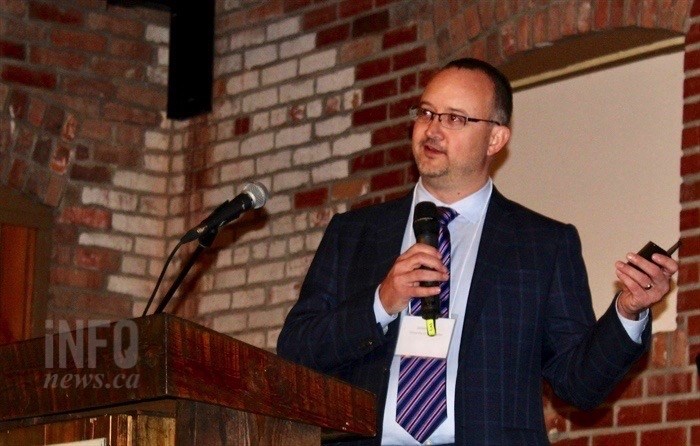
Jeremy Hess from the Centre for Health and Global Environment at the University of Washington talked about the health impacts of climate change at a symposium in Kelowna, Monday, Nov. 5, 2018.
(ROB MUNRO / iNFOnews.ca)
November 05, 2018 - 4:30 PM
KELOWNA - Two consecutive years with spring floods and summer forest fires provided plenty of evidence that climate change has a real impact on lives in the Interior of B.C.
But what’s not always so easy to see, but has a potentially much bigger impact, is the effect of climate change on health.
“We know that health is the number one issue for people when talking about climate change,” Diarmid Campbell-Lendrum from the World Health Organization told a climate change conference in Kelowna today, Nov. 5. “And, we know that health care providers are the most trusted community there is.”
But health care is not getting the funding support it requires in order to provide the essential services needed when there are extreme outcomes due to climate change, even though that money easily pays for itself in better health outcomes, he said
Campbell-Lendrum was one of the keynote speakers at a two-day symposium called Making the Links 2018: Climate Change, Community Health and Resilience. It was co-hosted by Interior Health, Simon Fraser University Faculty of Health Sciences and SHIFT Collaborative, a group working to deal with social and environmental issues.
While Campbell-Lendrum gave the global view, other speakers focused more closely on B.C. and the Pacific Northwest.
Jeremy Hess, from the Centre for Health and Global Environment at the University of Washington, talked about the importance of making the right decisions now.
“The path we start down today will have impacts for generations to come,” he said.
While it’s easy to see the impact of forest fire smoke on people with respiratory problems, there are bigger impacts on health that are less visible.
Global warming, for one thing, means diseases normally restricted to tropical climates are moving north, Hess said. Seattle, for example, has documented its first case of West Nile virus.
While a warmer climate can have some positive impacts, such as creating a longer growing season, there are also downsides. A longer ragweed season, for example, means more people will suffer longer from allergic reactions. And more people are likely to develop allergies in the years to come.
The symposium follows on the heels of a record-breaking year for forest fires in B.C. and the lowest snowpack on record. It attracted academics, business and health professionals and includes a number of speakers and workshops through tomorrow, Nov. 6, at the Laurel Packing House in Kelowna.
To contact a reporter for this story, email Rob Munro or call 250-808-0143 or email the editor. You can also submit photos, videos or news tips to the newsroom and be entered to win a monthly prize draw.
We welcome your comments and opinions on our stories but play nice. We won't censor or delete comments unless they contain off-topic statements or links, unnecessary vulgarity, false facts, spam or obviously fake profiles. If you have any concerns about what you see in comments, email the editor in the link above.
News from © iNFOnews, 2018